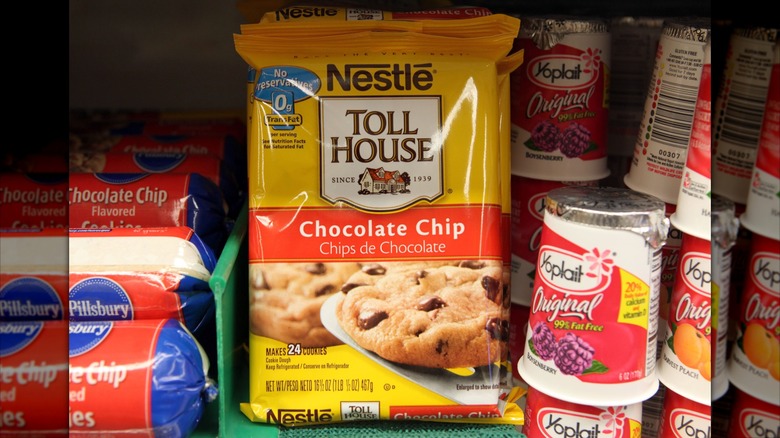The Recalled Cookie Dough That Led To Illness In 30 States
If you don't have time to make cookies from scratch (even with the best chocolate chip cookie recipe out there), prepackaged dough is a great alternative. When it comes to popular varieties, Nestlé Toll House offers a selection of refrigerated dough products that not only save time in the kitchen but are also quite tasty where cookie quality is concerned. That doesn't mean the iconic brand hasn't experienced its share of troubles over the years, including an incident in 2009 that resulted in 77 people across 30 states falling ill (almost half of whom required hospitalization). Reports from the time indicated that flour within the ready-to-bake product was contaminated with bacteria called Shiga toxin–producing E. coli, which is a strain very likely to cause a severe E. coli infection.
Investigators were unable to land on a definitive cause of illness among those affected, but the flour was suspicious because all other ingredients were deemed safe during the supplier investigation. E. coli infections often cause uncomfortable symptoms like stomach cramping and diarrhea, but 10 people affected by the 2009 outbreak developed hemolytic uremic syndrome, which can cause lasting kidney damage and other serious health effects. While the subsequent illness was quite severe, no deaths were reported as a result of this outbreak.
The dangers of raw cookie dough can't be ignored
The 2009 Nestlé Toll House cookie dough recall was unique because the way consumers used the product was a major factor in the illness that followed. According to the CDC, an investigation found that the majority of people who became ill consumed the contaminated dough raw, and as you hopefully know, eating raw cookie dough is a major no-no (despite how tempting it can be). In addition to health problems posed by raw eggs, raw flour can harbor harmful pathogens like E. coli, as illustrated by Nestlé Toll House's unfortunate situation.
Prepackaged cookie doughs feature warnings about consuming the product raw and urge consumers to bake the product according to instructions prior to eating. However, a 2011 study published in Clinical Infectious Diseases had another recommendation in the wake of Nestlé Toll House's E. coli outbreak. After investigating the incident, researchers suggested that prepackaged doughs should be reformulated so that they can be consumed raw without issue. In this case, replacing raw flour with a heat-treated variety can prevent bacterial infections. Similarly, recipes must contain pasteurized eggs, which also undergo a heat-treating process. Worth noting is that Nestlé Toll House has been embroiled in other cookie dough recalls since the 2009 incident, including a 2022 recall that involved plastic contamination.

